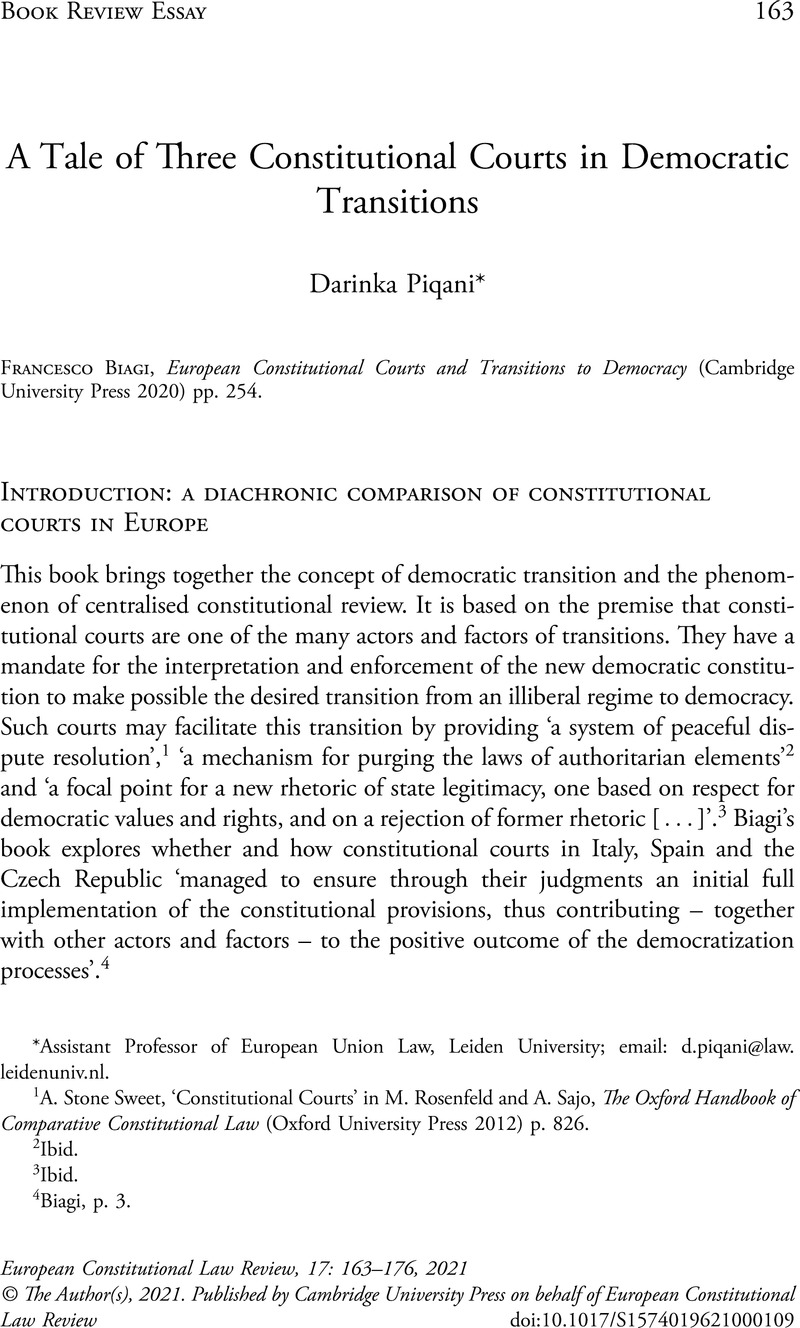No CrossRef data available.
Article contents
A Tale of Three Constitutional Courts in Democratic Transitions
Review products
Published online by Cambridge University Press: 17 May 2021
Abstract

- Type
- Book Review Essay
- Information
- Copyright
- © The Author(s), 2021. Published by Cambridge University Press on behalf of European Constitutional Law Review
References
1 A. Stone Sweet, ‘Constitutional Courts’ in M. Rosenfeld and A. Sajo, The Oxford Handbook of Comparative Constitutional Law (Oxford University Press 2012) p. 826.
2 Ibid.
3 Ibid.
4 Biagi, p. 3.
5 Biagi, p. 15.
6 See for instance H. Schwartz, The Struggle for Constitutional Justice in Post-Communist Europe (University of Chicago Press 2000); S. Bartole, Riforme Costituzionali nell’Europa Centro-Orientale, Da satelliti comunisti a democrazie sovrane (Il Mulino 1993); R. Prochazka, Mission Accomplished on Founding Constitutional Adjudication in Central Europe (Central European University Press 2002); W. Sadurski, Rights Before Courts, A Study of Constitutional Courts in Post-communist States of Central and Eastern Europe (Springer 2005); G. de Vergottini (ed.), Giustizia Costituzionale e Sviluppo Democratico nei Paesi dell’Europa Centro Orientale (G. Gappichelli 2000); W. Sadurski (ed.), Constitutional Justice, East and West – Democratic Legitimacy and Constitutional Courts in Post-Communist Europe in a Comparative Perspective (Kluwer Law International 2002); M. Verdussen (ed.), La Justice Constitutionnelle en Europe Centrale (Centres d’Etudes Constitutionnelles et Administratives, Bruylant/LGDJ 1997).
7 Biagi, p. 2.
8 Biagi, p. 7.
9 Biagi, p. 10.
10 Ibid.
11 Ibid.
12 For a general account on the constitutional transformations in these countries of Southern Europe, see for instance K.G. Mavrias, Transition Democratique et Changement Constitutionnel en Europe du Sud, Espagne, Grece, Portugal (Sakkoulas 1997).
13 R. Teitel, ‘Transitional Jurisprudence: The Role of Law in Political Transformation’, 106 Yale Law Journal (1997) p. 2032.
14 V.F. Comella, ‘The Consequences of Centralizing Review in a Special Court: Some Thoughts on Judicial Activism’, 82(7) Texas Law Review (2003-2004) p. 1705 at p. 1711.
15 J. Ferejohn and P. Pasquino, ‘Constitutional Courts as Deliberative Institutions: Towards an Institutional Theory of Constitutional Justice’, in Sadurski (2002), supra n. 5, p. 31.
16 See discussion on p. 31 of the book.
17 H. Steinberger, ‘The European Commission for Democracy Through Law (Venice Commission), Models of Constitutional Jurisdiction’, CDL-STD (1993)002, available at <https://www.venice.coe.int/webforms/documents/?pdf=CDL-STD(1993)002-e>.
18 See for instance Prochazka, supra n. 6, p. 17.
19 Biagi, p. 32.
20 Biagi, p. 38.
21 Ibid.
22 Biagi, p. 199.
23 Biagi refers to this definition by the Pavel Hollande, former vice-president of the Czech Constitutional Court, p. 149.
24 Ibid.
25 Biagi, p. 98.
26 Prochazka, supra n. 6, p. 59.
27 Sadurski (2005), supra n. 6, p.1-2.
28 Judgment 1/1956 of the Italian Constitutional Court.
29 Biagi, p. 62.
30 See discussion in Biagi, p. 105-110.
31 J. Solanes Mullor and A. Torres Pérez, ‘The Constitution of Spain: The Challenges for the Constitutional Order Under European and Global Governance’, in A. Albi and S. Bardutzky (eds.), National Constitutions in European and Global Governance: Democracy, Rights, the Rule of Law (Springer, 2019) p. 553, available at <https://doi.org/10.1007/978-94-6265-273-6_12>.
32 Biagi, p. 109.
33 See Z. Kuhn, ‘The Czech Republic: From a Euro-Friendly Approach of the Constitutional Court to Proclaiming a Court of Justice Judgment Ultra Vires’, in Albi and Bardutzky, supra n. 31, p 807, available at <https://doi.org/10.1007/978-94-6265-273-6_17>.
34 Ibid.
35 Stone Sweet, supra n. 1, p. 819.
36 Biagi, p. 71-76.
37 Biagi, p. 173.
38 Biagi, p. 183.
39 Biagi, p. 205.
40 Stone Sweet, supra n. 1, p. 825.
41 Ibid.
42 Biagi, p. 124.
43 Biagi, p. 176.
44 Biagi, p. 85.
45 Biagi, p. 150.
46 Biagi, p. 200.
47 Czech Constitutional Court, Judgment on Sugar Quotas, Pl. ÚS 50/04, 08 March 2006. This case concerned the constitutionality of a governmental regulation on the allocation of sugar quotas for sugar producers. Petitioners claimed that the regime adopted by the government violated the principle of equality, the freedom of producers to conduct business and the right to property. The Court annulled certain provisions of the Government Regulation on the ground that the Czech Government had acted ultra vires ‘by exercising an authority which had been already transferred to Community organs and which the Government, as a result, no longer held’. According to the Court, the Government was not authorised to adopt the implementing decree, as the competence to regulate the sugar market had been transferred, through Art. 10a of the Constitution, to EU institutions, which had regulated the issue through a directly applicable act, the EC regulation on sugar quotas.
48 A. Albi, ‘Ironies in Human Rights Protection in the EU: Pre-Accession Conditionality and Post-Accession Conundrums’, 15(1) European Law Journal p. 46 at p. 58.


